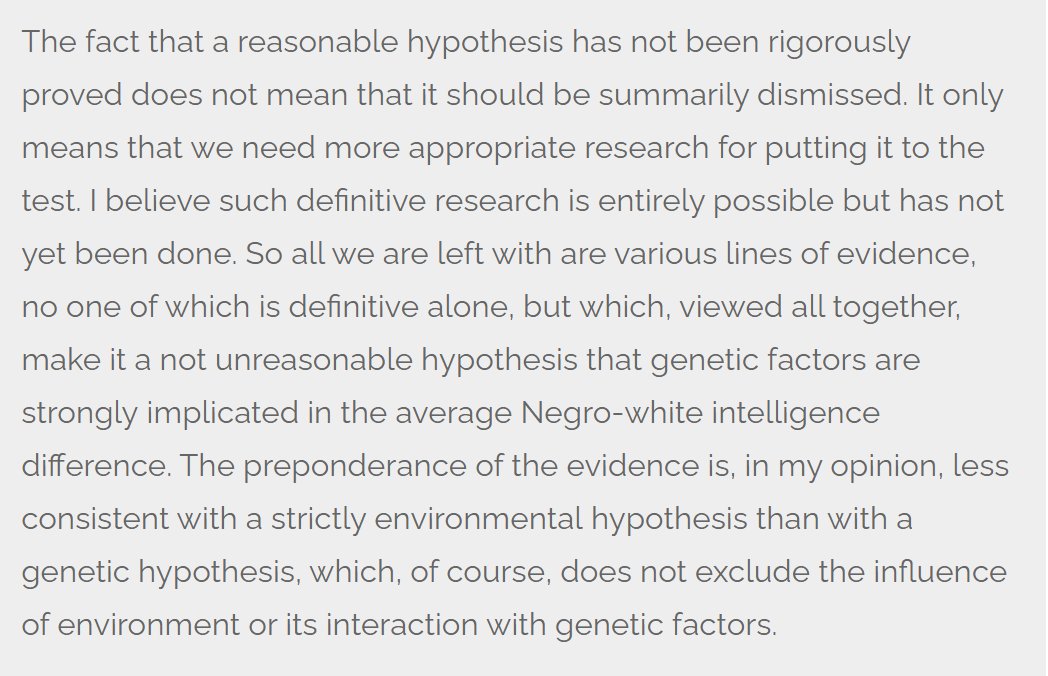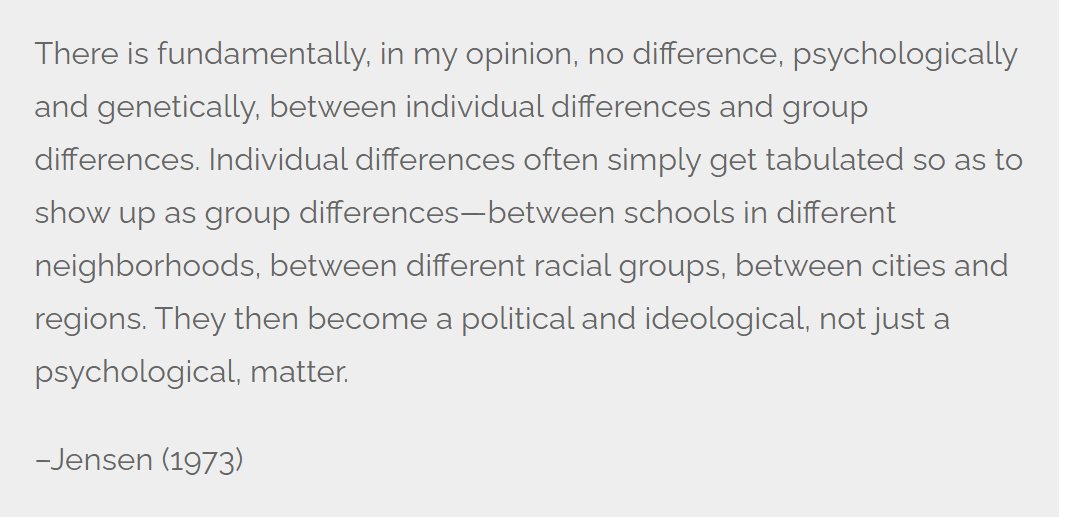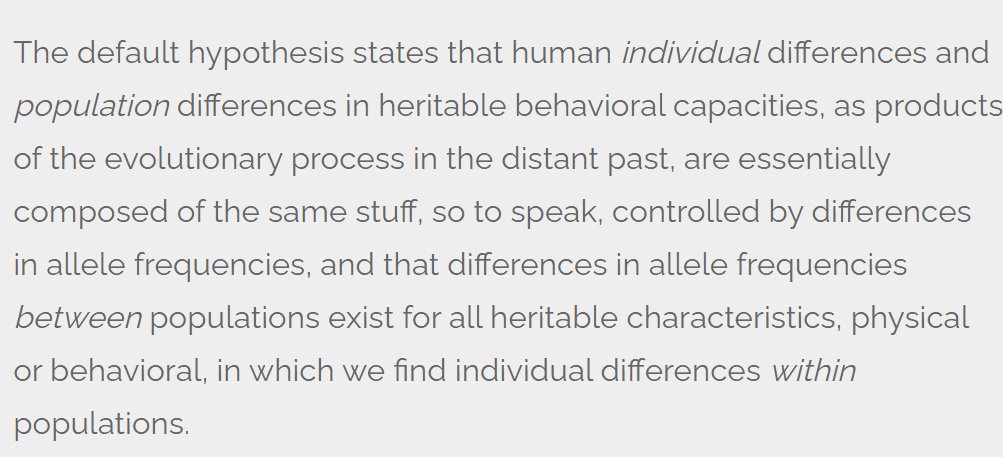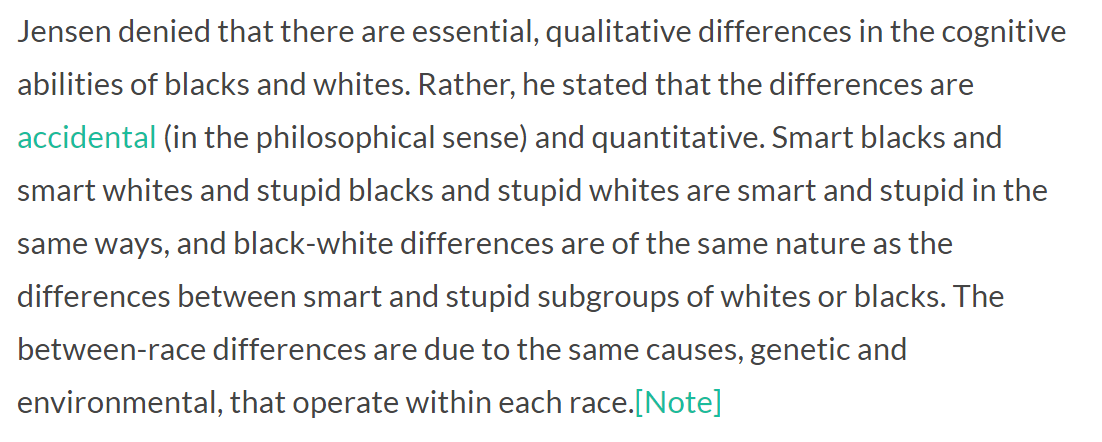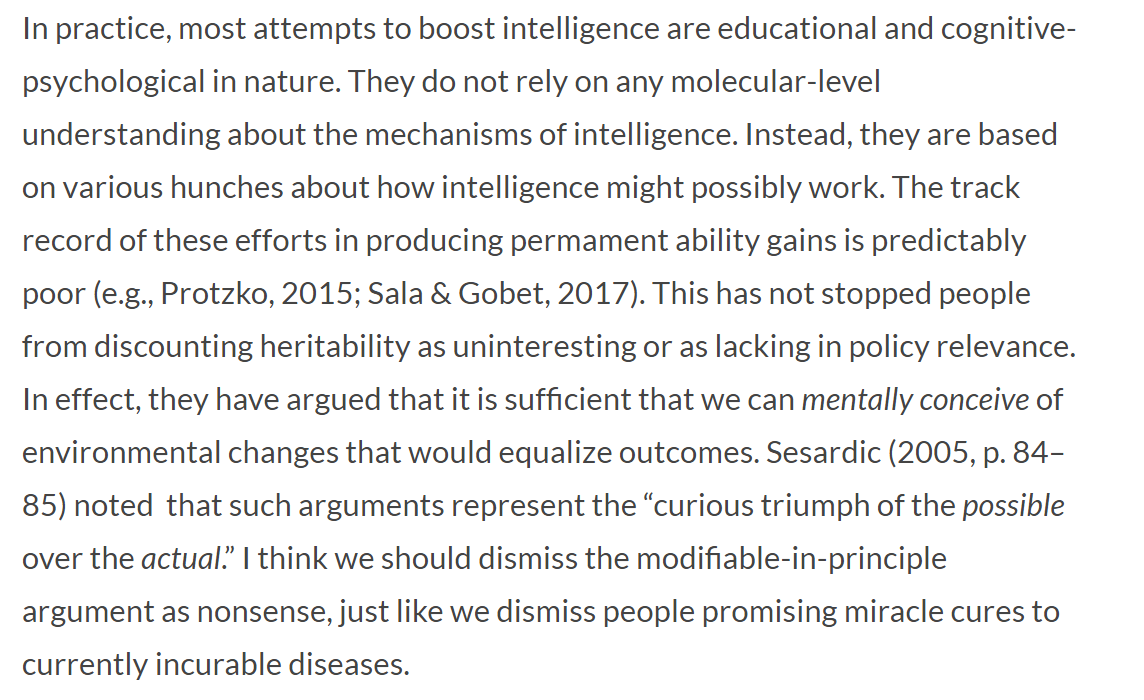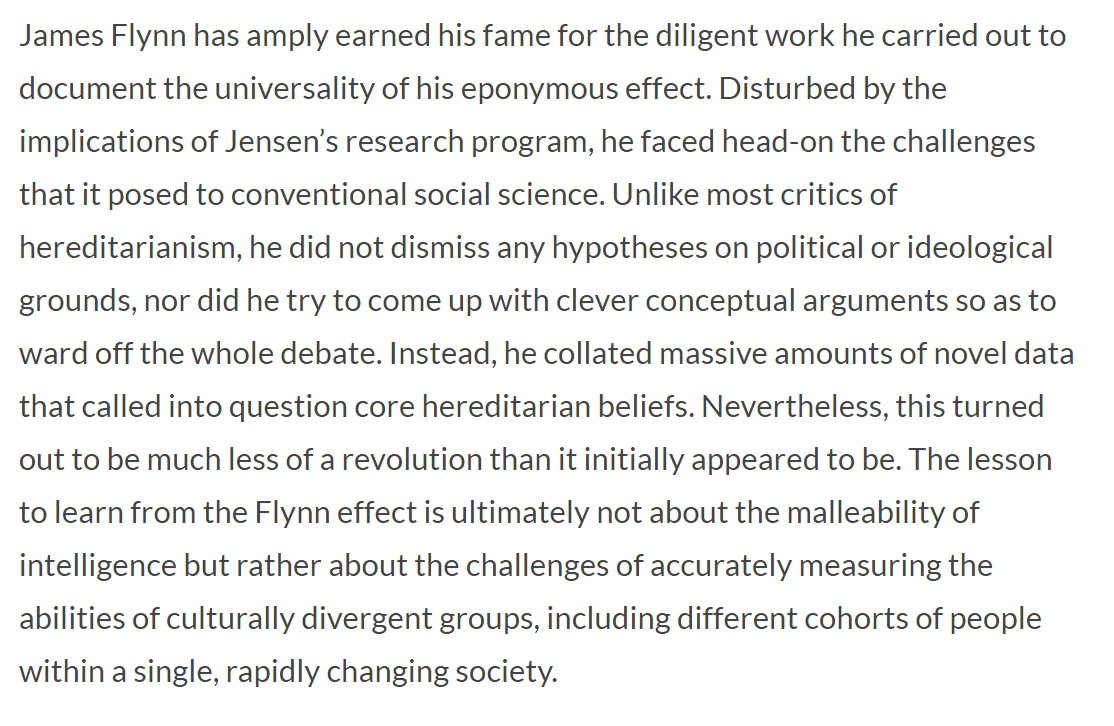Jensen& #39;s "not unreasonable hypothesis", 1969.
Jensen denied that there are essential, qualitative differences in the cognitive abilities of blacks and whites. Rather, he stated that the differences are accidental (in the philosophical sense) and quantitative.
In simple terms: a power difference, not a difference in type.
Dalliard summarizes the Jensen default hypothesis i several point, of which I think 3 are key:
1.
Individual differences in IQ in both blacks and whites are predominantly (up to 80% in adults) due to additive genetic influences.
1.
Individual differences in IQ in both blacks and whites are predominantly (up to 80% in adults) due to additive genetic influences.
2
Differences between whites and blacks in IQ scores are mainly (>50 percent) due to differences in the frequencies of alleles influencing g. The same alleles influence both within-race and between-race differences.
Differences between whites and blacks in IQ scores are mainly (>50 percent) due to differences in the frequencies of alleles influencing g. The same alleles influence both within-race and between-race differences.
3
Some (<50%) of gap may be due to non-genetic influences, including micro-environmental effects (e.g., lead poisoning) & indirect genetic effects (“genetic nurture”), especially in childhood. Sociological causes, such as discrimination, have at best a minor effect on the gap.
Some (<50%) of gap may be due to non-genetic influences, including micro-environmental effects (e.g., lead poisoning) & indirect genetic effects (“genetic nurture”), especially in childhood. Sociological causes, such as discrimination, have at best a minor effect on the gap.
Lubke et al. (2003) argues that psychometric measurement invariance has strong causal implications in the study of group differences:
when measurement invariance holds, the factors that explain differences within groups must also explain them between groups; the sources of group differences are the same as the sources of individual differences within each group.
Given that strict measurement invariance for IQ appears to usually hold between black and white Americans, the multi-group measurement invariance model can be seen as a phenotypic manifestation of Jensen’s default hypothesis.
Here is Dalliard& #39;s demolition of IQ boosting: triumph of the possible over the actual
Dalliard regards the Flynn effect as due to older cohorts being tested on inappropriate tests, thus failing to show measurement invariance
Environmentalists must simultaneously maintain that the black-white gap is caused by some of the most potent forces ever encountered in the social and behavioral sciences, and that those forces are largely unknown and harder to detect than just about anything else.
Given the size of the gap, environmentalists face a similar explanatory challenge as those who denied a causal link between smoking and lung cancer.
The permanence of the gap in the face of all fervent hopes to eliminate it, all the myriad policies, interventions, programs, radically altered political/social realities since civil rights movement suggests the phenomenon is not a contingent fact of contemporary circumstances
but rather something that has persisted and will persist for much longer than any environmentally-oriented social scientist or reformer has anticipated.
Reardon et al. (2019). looked at the gaps in standardized math and English language arts (ELA) tests administered to public school students in several hundred metropolitan areas and several thousand school districts from 2009 to 2013
About 2,300 school districts had sufficient numbers of white and black students to permit gaps to be estimated. Every single district had a gap favoring white students.
The deficiency compared to whites is localized to intellectual functions and specifically to g. No evidence of large black deficits in most psychological domains unrelated to IQ. Blacks appear to be in some ways more mentally healthy & confident about their abilities than whites
Ironically, it is in environmentalist explanations that races are reified into separate essences so that even when members of different races share the same social world, they always experience it in very different ways.
Given the persistence of the IQ gap across generations, socioeconomic classes, & geographic locations, environmentalists are, in order to explain the gap, forced to postulate an extraordinarily tenacious & rigid linkage between racial identity and one’s experience of the world.
To argue that because the problem is complex, or because we cannot be 100 percent certain of the answer, we should refrain from trying to answer it at all is not an argument against race and IQ research in particular. It is an argument against all scientific inquiry.
I would love to see non-hereditarians formulate their models in more detail, with more attention paid to testable implications, psychometric & behavioral genetic details, & heuristics like Hill’s criteria, enabling better comparisons between genetic & environmental explanations.
The frequent moral panics about racialist thinking and attempts to drive it out of academia betray a very exaggerated belief in the power of scientific arguments to effect social change.
It reflects a narcissistic conviction by academics that their work has great societal significance. Equally far-fetched is the idea that a resurgence of race realist research would rectify demographic & other trends that so alarm conservatives in contemporary Western societies.
The current century will offer the racially informed observer plenty to look at. In many ways, the future is already here.
We can see the familiar, persistent racial disparities in the educational achievement of today’s schoolchildren in America. The demographics of human capital for the rest of the century will offer no surprises.
Worth reading. https://humanvarieties.org/2019/12/22/the-persistence-of-cognitive-inequality-reflections-on-arthur-jensens-not-unreasonable-hypothesis-after-fifty-years/">https://humanvarieties.org/2019/12/2...

 Read on Twitter
Read on Twitter